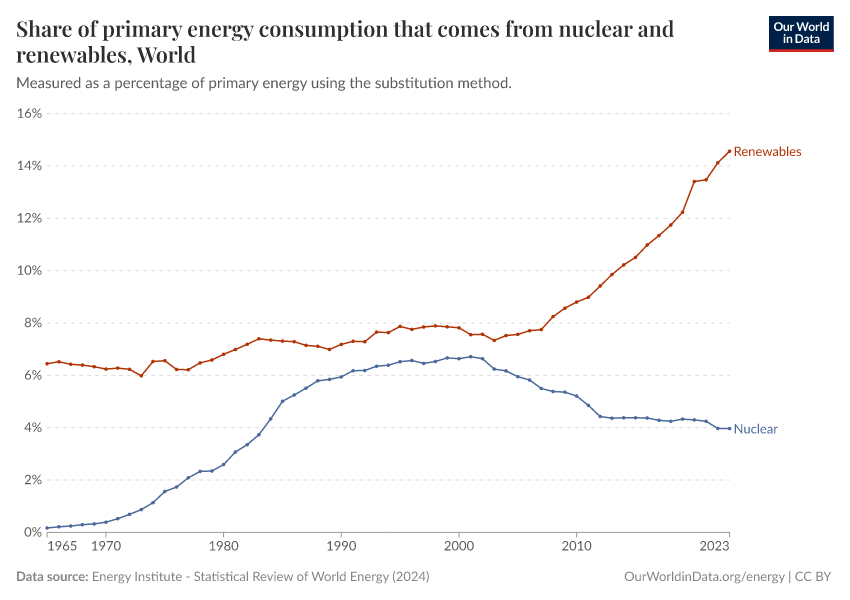Is the world making progress in decarbonizing energy?
An increasing share of energy comes from low-carbon sources. But this transition needs to happen much faster.
In 2021, 18% of the world’s primary energy came from low-carbon sources. Low-carbon energy is energy from nuclear and renewables.
How has this share changed? Have we made progress on decarbonizing the global energy supply?
In the line chart we see how the share of global energy that comes from low-carbon sources has changed over time. It more than doubled in the 20 years from 1970 to 1990: increasing from 6% to 13%. At this point, progress appeared to stall for several decades, but is now rising again.
Renewables have grown strongly, but a lot of this has simply offset a decline in nuclear
To understand the different rates at which we’ve made progress on decarbonization, it’s useful to break it down into its two components: nuclear energy and renewables. This is shown in the chart.
First, we see why we made progress in the 1970s and 80s: nuclear energy was growing quickly, and renewables – mainly hydropower – were also growing, albeit slowly. But throughout the 1990s we see that neither nuclear or renewables made much progress; we were producing more of each source in absolute terms, but this growth could not outpace the increased demand for energy overall. Low-carbon energy’s share didn’t increase much.
What we see in the first decade of the 2000s is a complete divergence of these sources. Renewables went up. Nuclear went down. Countries stopped investing in new nuclear plants; and some closed down. In absolute terms the total amount of energy we produced from nuclear stagnated, and for several years actually declined.
The world made a lot of progress on renewables over this period. But unfortunately some of these gains were offset by the decline of nuclear. Only recently – with a rapid growth in wind and solar power – has low-carbon energy made a comeback. We have continued to make progress on decarbonization, but we could have made much more.
Whether we care about decarbonization or the health impacts of energy production, moving away from fossil fuels to renewables and nuclear is crucial – they are much safer and cleaner than fossil fuel power. When progress on these sources work against rather than with each other, it is fossil fuels that win.
Cite this work
Our articles and data visualizations rely on work from many different people and organizations. When citing this article, please also cite the underlying data sources. This article can be cited as:
Hannah Ritchie (2021) - “Is the world making progress in decarbonizing energy?” Published online at OurWorldinData.org. Retrieved from: 'https://ourworldindata.org/decarbonizing-energy-progress' [Online Resource]BibTeX citation
@article{owid-decarbonizing-energy-progress,
author = {Hannah Ritchie},
title = {Is the world making progress in decarbonizing energy?},
journal = {Our World in Data},
year = {2021},
note = {https://ourworldindata.org/decarbonizing-energy-progress}
}Reuse this work freely
All visualizations, data, and code produced by Our World in Data are completely open access under the Creative Commons BY license. You have the permission to use, distribute, and reproduce these in any medium, provided the source and authors are credited.
The data produced by third parties and made available by Our World in Data is subject to the license terms from the original third-party authors. We will always indicate the original source of the data in our documentation, so you should always check the license of any such third-party data before use and redistribution.
All of our charts can be embedded in any site.

